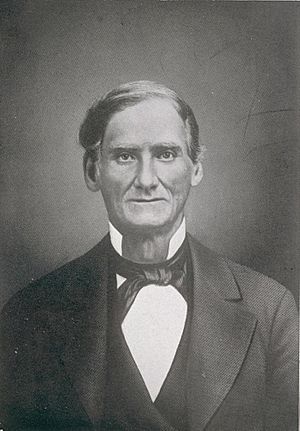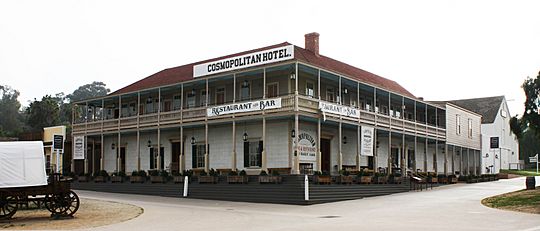Juan Bandini facts for kids
Quick facts for kids
Juan Bandini
|
|
|---|---|

Juan Bandini
|
|
| Born | 1800 |
| Died | November 4, 1859 (aged 58-59) Los Angeles, California, U.S.
|
| Spouse(s) | Marie de los Dolores Estudillo, Refugia Argüello |
Juan Bandini (born 1800 – died 1859) was an important person from Peru. He was a public figure, a politician, and a rancher in California. He is best known for helping to develop the city of San Diego in the mid-1800s.
Contents
Early Life and Family History
Juan Bandini was born in Lima, Peru, in the year 1800. His father, José Bandini, was a Spanish sea captain. In 1819, his father came to California. He later took part in the Mexican War of Independence in 1821. After the war, Juan Bandini's family moved to San Diego. They arrived there on September 1, 1834.
Building a Family and Home
Juan Bandini married Marie de los Dolores Estudillo on November 20, 1822. She was the daughter of Captain José María Estudillo. They had three daughters named Arcadia, Ysidora, and Josefa. They also had two sons, but one died as a child.
Later, Bandini married his second wife, Refugia Argüello. She was the daughter of Santiago Argüello. With Refugia, he had three sons: Juan de la Cruz, Alfredo, and Arturo. They also had two daughters named Dolores and Victoria.
In 1829, Bandini built a large, U-shaped house called Casa de Bandini. It started as a one-story house with 12 rooms. Sadly, he had to sell his house in 1859 because of money problems. Part of the building was turned into a store. Later, in 1869, his house became the Cosmopolitan Hotel. A second story and a porch were added then. Today, the house is still in Old Town San Diego. It has been restored and is a hotel and restaurant again.
Juan Bandini's Public Service
Juan Bandini held many important public jobs. He was a member of the assembly, which is like a local government group. He also worked as a sub-comisario of revenues, helping with taxes. He even served as a substitute congressman, representing his area.
Life as a Rancher
In 1836, Bandini was given land called Rancho Tecate. However, he soon had to leave it. Bands of people raided the ranches around San Diego in 1836-1837. Today, this area is the town of Tecate.
In 1838, the Mexican government gave him another large piece of land. This was Rancho Jurupa, located in what is now San Bernardino and Riverside Counties in California.
During the Mexican–American War, Bandini supported the Americans. He and Santiago Arguello asked people not to fight against the Americans. After the war, Bandini became unhappy with the U.S. government. He especially disliked the Land Act of 1851. This law allowed people to challenge land grants that Mexicans had received. The Treaty of Guadalupe Hidalgo in 1848 had promised that these land grants would be recognized.
From March to September 1848, he served as a Juez de Paz (Justice of the Peace) for San Diego Pueblo. In 1850, he opened a store in San Diego and built the Gila House hotel. Soon after, he moved to Mexico. In 1855, he moved to Los Angeles, where he passed away in 1859.
How People Saw Juan Bandini
Juan Bandini was known for being very elegant and polite. He always dressed well and had a refined way about him. People said he was a charming public speaker and a good writer. He was also a fine dancer, a fair musician, and an excellent horseman. His home was a popular place for social gatherings in San Diego.
Bandini was also known for his clever, sarcastic sense of humor. Richard Henry Dana Jr., a writer, described him in his book Two Years Before the Mast. Dana said Bandini had a "slight and elegant figure" and "moved gracefully." He also noted that Bandini spoke "the best of Castilian" (Spanish) with a "pleasant and refined voice."
Dana saw him again and said Bandini "gave us the most graceful dancing that I had ever seen." He described Bandini's outfit: "white pantaloons, neatly made, a short jacket of dark silk gaily figured, white stockings and thin Morocco slippers upon his very small feet."
Even though he was charming, Bandini's generous lifestyle often caused him money problems. His children sometimes had to help him out financially in his later years.
 | Aaron Henry |
 | T. R. M. Howard |
 | Jesse Jackson |


